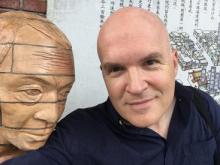What Is It
Religions rely on miracles to demonstrate the authenticity of figures thought to have supernatural powers. Many people feel that key events in their lives were literally miracles. Many even claim to have witnessed miracles. But what counts as a miracle? Is it true, as Hume argued, that it is always more rational to disbelieve the testimony of a miracle than to believe in the miracle itself? John and Ken explore what miracles are, and what would constitute good reasons for believing in them, with Peter Graham from the University of California Riverside.
Listening Notes
Could a fully rational person believe in the occurrence of real miracles? Ken and John emphasize that the topic of discussion is not “pseudo-miracles”—cases in which really unlikely things happen—but genuine cases of divine intervention in which the laws of nature are violated or suspended. John is skeptical of these cases, asserting that we ought to seek out alternative scientific explanations instead of concluding that something miraculous occurred. Ken isn’t so sure, and he suggests that the universe might seem cold and dead if miracles weren’t possible.
John and Ken welcome guest Peter Graham, a professor of Philosophy at UC Riverside who researches the nature of knowledge. He points out that if we want to find out whether it is rational to believe in miracles, we need to think about what would count as good evidence for them. In particular, because most of us only hear about miracles secondhand, through the stories of others, we need to reflect on the standards by which we evaluate the testimonies of other people. Actual reports of miracles, he claims, have never met those standards, so it’s irrational to believe in them. Ken and John express skepticism about these standards by pointing out that they can sometimes lead us astray. John makes the deeper challenge that maybe it’s better not to be rational at all. In response, Peter says that the standards of evidence he has been emphasizing are very familiar to us and play an important role in our daily lives.
But if we don’t believe in miracles, will we lose all sense of awe and wonder in the world? Peter says no; the grandeur of the universe by itself can inspire awe. Ken worries that maybe this isn’t enough. Even if we don’t think the laws of nature are ever suspended, might we think that it’s miraculous just that the universe came into existence at all? Perhaps there was an original miracle brought about by a divine intelligence. Peter points out that his argument doesn’t rule out the existence of a God. Rather, it establishes that it’s not rational to believe people who claim to have performed or seen miracles. The philosophers conclude the discussion with some thoughts about finding meaning in a secular age.
- Roving Philosophical Reporter (Seek to 5:54): Caitlin Esch speaks with Joan Wester Anderson and Amy Oscar, two authors who write about miracles and have spoken with many people who claim to have experienced them.
- 60 Second Philosopher (Seek to 3:05): Ian Shoales discusses the phenomena that we now deem “miracles” and points out how much they differ in significance from “actual” miracles.




Comments (1)
shiateacher
Monday, March 24, 2025 -- 2:09 PM
yes it is true miraclesyes it is true miracles happen but not with simple human and Shia Quran Teacher, an online Quran Shia teachers’ organization, is for people who are living abroad. Shia Quran teacher Online is surely the best place for you to Learn Holy Quran.